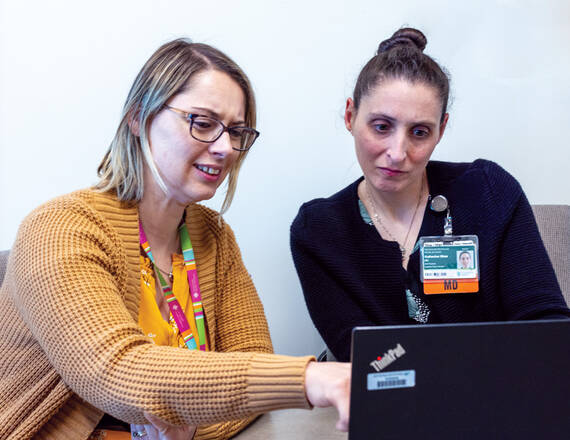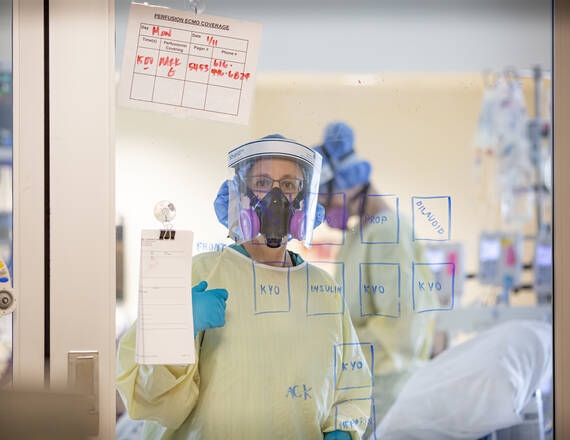Dartmouth Health Children's Launches Pediatric Mental Health Access Initiative
Among the many factors contributing to the mental health crisis faced by America’s youth, access to quality care remains a problem. Children and families encounter numerous barriers to care, such as transportation, time away from school and work, a shortage of providers, and ongoing stigma of seeking mental health care. These obstacles often prevent children from receiving the care they need in a timely manner—or at all.

To help alleviate some of these barriers, the Departments of Psychiatry and of Pediatrics launched the Pediatric Mental Health Access Initiative at Dartmouth Health Children’s, a multifaceted portfolio of programs that address various aspects of the youth mental health crisis with a specific focus on improving the impact and accessibility of quality care.
“There are people who are suffering every day, so we are trying to address these mental health problems earlier and expand quality services,” says Francine Morgan, MBA, the program director for the Pediatric Mental Health Access Initiative. “If you aren’t feeling like yourself, going to a therapist should be the same as going to your primary care doctor for strep throat. You can find information on Google, but that’s not quality care.”
Morgan says the initiative relies on three primary areas for success: connecting departments across the Dartmouth Health Children’s system, collaborating with external community partners, and innovating solutions to address persistent problems. The initiative currently spans the departments of pediatrics, psychiatry, community and family medicine, and population health, initially funded with a $1.5 million gift from the family and friends of Jonathan Guloyan, who dealt with mental health issues for many years before his death by suicide.
“We are trying new ways to reach providers and patients where they are,” Morgan says. She notes that the programs within the Pediatric Mental Health Access Initiative are “multiple doorways that lead to the same goal.”
Pediatric Collaborative Care: Creating the Model
Successful collaborative care models for mental health conditions have been well studied in adults, but there’s little research into how such models would work for pediatric populations. So, as part of the Pediatric Mental Health Access Initiative, the Dartmouth departments of pediatrics and psychiatry have joined together to greatly extend their implementation of a pediatric collaborative care model (dubbed PediCoCM, for short) in pediatric primary care settings throughout the health system. Clinicians are providing timely access to mental health care for children and gathering evidence to hone the model.
“Kids are more likely to engage with a mental health intervention when they’re in a familiar environment,” says Katherine Shea, MD ’09, MPH ’15, a child psychiatrist at Dartmouth Hitchcock Medical Center and assistant professor of psychiatry and of pediatrics at the Geisel School of Medicine at Dartmouth. “When a need is identified at a primary care visit, a behavioral health clinician (BHC) can come in at that moment and foster engagement early. The idea is to capture kids early to prevent exacerbation of psychiatric symptoms.”
PediCoCM is designed to help children with mild to moderate depression, anxiety, substance misuse disorders, and disruptive behavior through an integrated model that has been shown to improve access to care, improve patient outcomes, and reduce costs. BHCs are licensed, master’s-prepared clinicians embedded in primary care clinics to meet face-to-face with patients, follow up with children and families about progress, and support primary care physicians in providing mental health interventions. BHCs meet weekly with Shea, who provides medical expertise as a child psychiatrist, making recommendations for changes to treatment if a patient’s symptoms are not improving.
“It’s different from adult mental health care because kids come with families, so a lot of the work we do is with parent-child interactions, not just medication,” Shea says, noting that the model is still in development; for example, clinicians are still figuring out the best ways to follow up with teens. (“They don’t like to talk on the phone,” for example, Shea explains.)
In addition to embedded clinicians in a primary care setting, the collaborative care model also involves patient screening and a patient registry to track progress and follow up. A PCP “champion”—either an MD, DO, or APRN who is especially interested in improving mental health care access—will also be working at each primary care site to facilitate the PediCoCM program development, implementation, and evaluation.
“The collaborative care model provides short-term, evidence-based care within a week, rather than a child waiting months for an appointment,” Shea says. “Children really do improve when they get care quickly.”
Teleconsult Access Line for Providers
Pediatricians are often on the front lines of mental health care for children and adolescents, yet they may lack the specialized training and support required to meet the mental health needs of some of the most complex cases.
Child psychiatrists at Dartmouth Health Children’s are now able to bridge the gap between pediatricians and mental health specialists through the Child Psychiatry Teleconsult Access Line, which is part of the New Hampshire Mental Health Care Access in Pediatrics (NH MCAP) initiative that promotes access to children’s behavioral health care within the state. Pediatric healthcare providers anywhere in New Hampshire can call the access line at 603-650-4741 and schedule a free telephone consultation with a child psychiatrist at Dartmouth Health Children’s, enabling pediatricians to address their patients’ behavioral and mental health issues more effectively within their practice.
The teleconsultation line, which is a collaboration between Dartmouth Health Children’s and the University of New Hampshire’s Institute for Health Policy and Practice, will alleviate multiple barriers to timely mental health care for children. After talking with a child psychiatrist, pediatricians will be able to offer mental health care immediately in a setting that’s familiar to the child and family, preventing the need for the patient to wait weeks or months to see a specialist.
“We will disseminate our knowledge to pediatricians anywhere in New Hampshire to help them care for their patients, so these conditions can be treated earlier to prevent worsening symptoms,” says Jennifer McLaren, MD, DFAACAP, section chief of child and adolescent psychiatry and the medical director of the New Hampshire Bureau of Developmental Services. “If the child psychiatrist recognizes a complex problem during a teleconsultation, they can recommend a referral to a specialist if the child needs a higher level of care.”
This specialized line is an outgrowth of the broader eConsults program at Dartmouth Health, through which primary care providers can request specialty consultations on individual patient cases through the electronic medical record system.
Bridging the Gaps With Tools for Parents
Families will soon have direct access to a new tool to supplement traditional behavioral healthcare called Behavior Bridge, a self-guided digital health intervention for parents of children and adolescents with behavior issues. The program is expected to be available for pediatricians to distribute to parents by early 2025.
“Getting quality care can make a long-term difference in a child’s life,” says JT Craig, PhD, a child psychologist at Dartmouth Health Children’s and assistant professor of psychiatry at Geisel. “We can make sure every child has a path forward in the very moment they are diagnosed with ADHD. They can access quality care right away, and they won’t have to wait for months for an appointment with a specialist.”
The Behavior Bridge content is delivered through video modules that provide evidence-based information and practice activities so parents can apply the skills with their child—giving the family a path forward when a therapist isn’t immediately available.
“We have packaged the most effective intervention skills into mini videos, and parents will be able to access these videos freely on their own time,” says Christina Moore, PhD, FEL ’22, lead supervisor of child psychotherapy training, a child psychologist at Dartmouth Health Children’s, and an assistant professor of psychiatry at Geisel who is working with Craig on the project. “We’ve delivered this information through telehealth with trained therapists who walk parents through the same content. So why not make it even easier for parents to access?”
Behavior Bridge is currently being tested and vetted in focus groups with child healthcare providers as well as with parents who are dealing with challenging behaviors.
“Pediatricians might not know how to help a 4-year-old with ADHD,” Craig says. “But not intervening can leave that child with significant problems throughout their life. So, this is an opportunity for pediatricians to be able to offer the parents our program and get the child the help they need.”
To learn more about the Pediatric Mental Health Access Initiative or Dartmouth Health Children's, contact Polly Antol at 603-646-5316 or at Polly.Antol@hitchcock.org.

